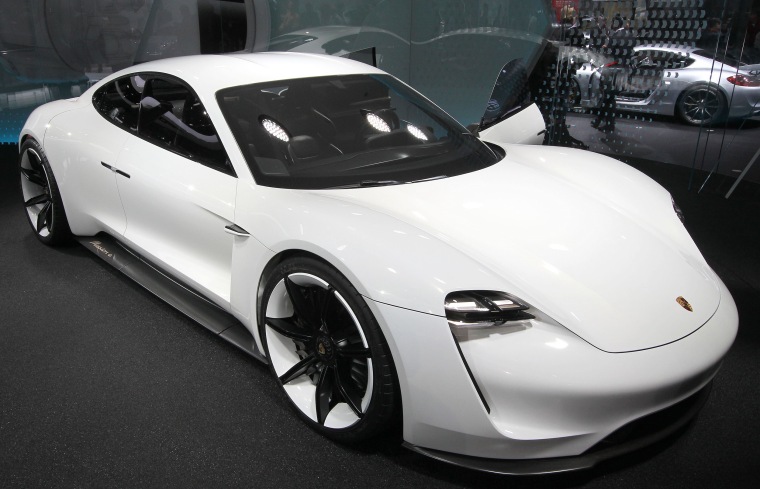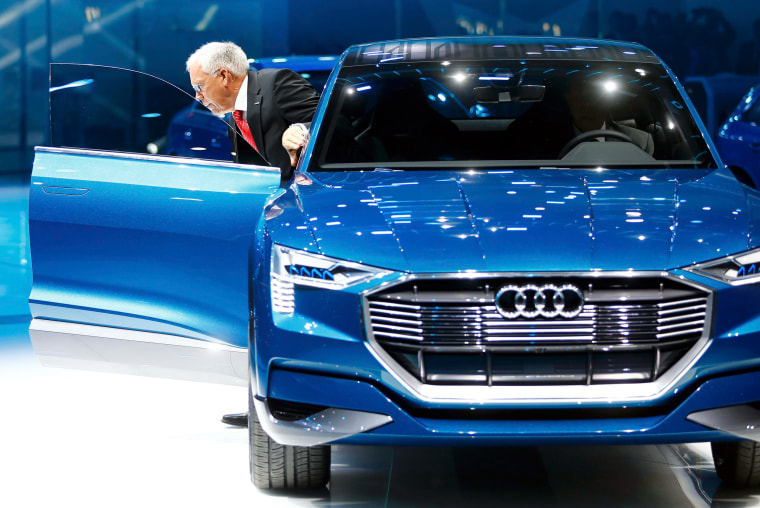If your image of a battery car runs along the lines of a Nissan Leaf, Toyota Prius or Chevrolet Volt, Porsche is about to blow your doors off.
The Porsche Mission E, a concept sports car making its debut at the Frankfurt Motor Show this week, can punch out more than 600-horsepower, even more than its familiar 911 model, launching it from 0 to 60 in just 3 seconds.
Meanwhile, at its own Frankfurt stand, Audi is showing off the new e-tron Quattro SUV concept. It’s only slightly slower – but capable of traveling more than 300 miles before recharging.
Just about everywhere you look in Frankfurt, luxury makers are showing production or concept battery-electric vehicles. The announcements pose a potentially serious challenge to Tesla Motors, the California-based battery-carmaker that has found a surprisingly strong niche for electric vehicles among luxury buyers.

“Every car will be electrified,” said Ulrich Hackenberg, the board member overseeing technical development at Audi, when asked what the brand’s line-up will look like a decade from now. That includes not only pure battery-electric vehicles but plug-in hybrids that will allow a motorist to drive in pure electric mode in a city, then switch to gasoline mode for longer trips.
Mercedes-Benz, for one, has promised to put 10 plug-in hybrid electric vehicles, or PHEVs, into production by 2017, and other luxury brands, including Audi, BMW Cadillac, and even Bentley, are set to follow.
But pure electric propulsion is suddenly gaining traction. Even Aston Martin, the supercar manufacturer long associated with fictional spy 007, is developing a battery-electric model.
There are a number of reasons, notably the new emissions and fuel economy regulations going into effect around the world. California, for example, will require every manufacturer to sell a set percentage of so-called Zero-Emissions Vehicles. China has enacted strict limits on new vehicle registrations in Shanghai, Beijing and a number of other cities, but qualified battery cars are exempt. Meanwhile, a number of European cities are considering outright bans on vehicles unless they’re running on battery power.
At the same time, noted Audi’s Hackenberg, electric vehicle technology is rapidly evolving. At the beginning of the decade, a kilowatt-hour of lithium-ion batteries cost as much as $1,000. Most automakers are now paying around $400, and the Audi tech chief suggested that will be down to around $200 by the time the production version of the e-tron Quattro SUV comes to market.

Even then, this technology won’t come cheap. Of the $6.4 billion Mercedes parent Daimler AG spent on R&D in 2014 almost half went to develop low-emissions and alternative powertrain technologies, including battery cars and hydrogen fuel-cell vehicles.
The good news for potential buyers is that batteries are not only coming down in price but also are becoming smaller, lighter and more powerful. That will make it easier to challenge Tesla by delivering longer range. Mercedes research chief Thomas Weber recently revealed the maker is working on a new modular battery-car drivetrain that would offer more than 300 miles range and which will be usable in a variety of different vehicles.
Protect and Swerve: LAPD's Electric Cruiser Joins List of Odd Cop Cars
Skeptics question whether buyers will make the switch, especially at a time when gas prices are again threatening to drop below $2 a gallon in the U.S., the world’s largest luxury car market. But industry planners are convinced that if they can overcome issues like cost, range and performance, motorists will climb aboard.
Battery power does have several advantages likely to appeal to luxury buyers. Electric motors make maximum tire-spinning torque as soon as a driver hits the throttle is one plus. The vehicles are also incredibly quiet. And by mounting batteries in a vehicle’s floor, designers could free up more space for passengers and cargo.
There remain other challenges, acknowledged Carlos Ghosn, CEO of Nissan, whose luxury arm Infiniti is studying its own battery options.
“The real key will be to develop an infrastructure allowing battery-car owners to charge up as easily as they now fill a tank with gas,” he said.
There are a growing number of public chargers in the U.S. and Europe, more and more of them so-called Level III high-voltage systems capable of charging up a vehicle like the nearly 300-mile Tesla Model S P85d in under 30 minutes.
Is Toyota Trying to Build A Flying Car? If So, It Won't Be the First
Tesla is set to roll out a second model in the coming months, the Model X SUV, and will begin taking orders for the more mainstream Model III next spring – even though production is two years away.
Tesla has shown that luxury buyers will throw the green switch, competitors agree.
“What we see with Tesla is that there is a market there,” said Hackenberg. “People are open to this new technology.”
More from The Detroit Bureau
BMW Cancels Opening Frankfurt News Conference When CEO Collapses on Stage
Quirky Mercedes Concept Grows Longer At High Speeds to Save Fuel